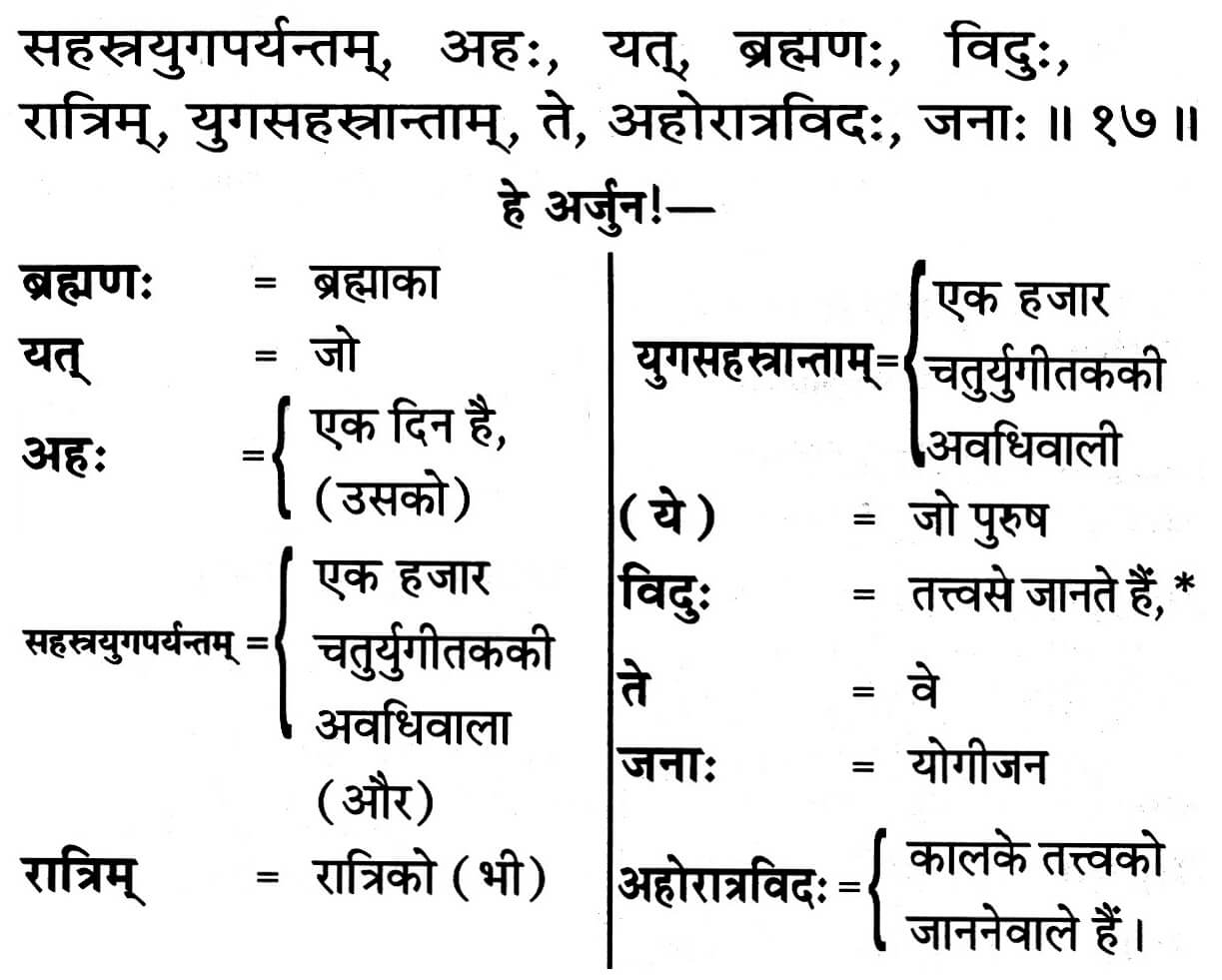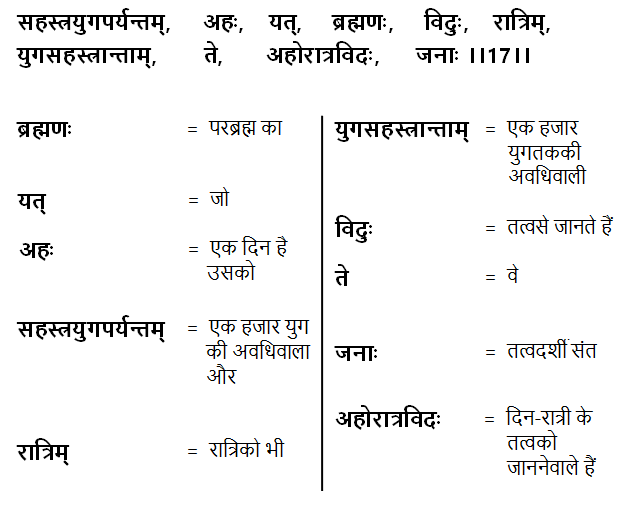Gita 8.17
सहस्त्रयुगपर्यन्तम्, अहः,यत्,ब्रह्मणः, विदुः,रात्रिम्,
युगसहस्त्रान्ताम्, ते, अहोरात्रविदः, जनाः।।17।।
Gita 8.17
Sahastryugparyantm’, ahH, yat’, BrahmnH, viduH, raatrim’,
Yugsahastraantaam’, te, ahoraatrvidH, janaaH ||17||
Translation: (BrahmnH) ParBrahm’s (yat’) that (ahH) one day (sahastryugparyantm’) of duration of one thousand yugas and (raatrim’) also the night (yugsahastraantaam’) of duration of one thousand yugas (viduH) know in essence (te) those (janaaH) Tatvdarshi saints (ahoraatrvidH) know the truth about the day-night. (17)
Gita 8.17: Those who know in essence that ParBrahm’s one day is of duration of one thousand yugas and the night is also of duration of one thousand yugas, those Tatvdarshi saints know the truth about the day-night.
Bhagavad Gita Chapter 8 Verse 17 - Meaning
The key words to understand Gita 8.17, are as follows:
- Sahansr Yug = 1000 Yugas
- BrahmanH (ब्रह्मणः) = God bigger than Brahm. This word ब्रह्मणः does not mean Brahma
Note: - The other translators of Bhagavad Gita have written one day of Brahma to be of one thousand chaturyug, which is not right because in the original Sanskrit, ‘sahansr’ yug (thousand yugas) has been written, rather than chaturyug (four yugas). Secondly, the word ‘BrahmanH’ has been written in the verse. The word used is not Brahma and neither does it mean Brahma. Because of absence of Tatvgyan (true spiritual knowledge), they have written incorrect meanings of words.
This day and night calculation mentioned in Gita 8.17 is for God bigger than Brahm and it denotes the day and night of Par Brahm. You will read about the ages of all the Gods below. Point number 5 describes the day and night of Par Brahm which is of 1000 Yugas each.
The Age of all the Gods
- Age of Rajgun Brahma: - Brahma’s one day is of a thousand chaturyug, and the night is of the same duration. One month is of thirty days-nights; one year is of twelve months, and the age of Brahma is of a hundred years, which is of seven crores twenty lakh chaturyug.
- Age of Satgun Vishnu: - Shri Vishnu ji’s age is seven times the age of Shri Brahma ji i.e. the age of Shri Vishnu ji is fifty crore forty lakh chaturyug.
- Age of Tamgun Shiv: - Shri Shiv ji’s age is seven times the age of Shri Vishnu ji i.e. the age of Shri Shiv ji is three arab fifty-two crore eighty lakh chaturyug.
- Age of Kaal Brahm i.e. Kshar Purush: - After the death of seven trilokiye Brahma (Kaal’s Rajgun son), one Trilokiye Vishnu ji dies, and after the death of seven trilokiye Vishnu (Kaal’s Satgun son), one trilokiye Shiv (Brahm/Kaal’s Tamogun son) dies. After the death of 70,000 (seventy thousand i.e. 0.7 lakh) such trilokiye Shiv, there is death of one Brahmlokiye MahaShiv (SadaShiv i.e. Kaal). Equivalent to the age of one Brahmlokiye MahaShiv (three arab fifty-two crore eighty lakh chaturyug) is one yug of ParBrahm (Akshar Purush). One day of ParBrahm is of one thousand such yugas. After the completion of one day of ParBrahm, the twenty-one Brahmands of Kaal-Brahm get destroyed, and Kaal and Prakriti (Durga) die. After the completion of the night (which is of one thousand yugas) of ParBrahm, at the beginning of the day, Kaal and Durga are reborn. Then they start creation in one brahmand like before. In this way, one day of ParBrahm i.e. Akshar Purush is of one thousand yugas and the night is of the same duration.
- Age of Akshar Purush i.e. ParBrahm: - One yug of ParBrahm is of three arab fifty-two crore eighty lakh chaturyug. One day of ParBrahm is of one thousand yugas and the night is of the same duration. In this way, one day-night of ParBrahm are of two thousand yugas; one month is of 30 days; one year of twelve months, and the age of ParBrahm is of a thousand years. It has been proved from this that ParBrahm i.e. Akshar Purush is also mortal. Therefore, in Gita Chapter 15 Verse 16-17, and Gita Chapter 8 Verse 20 to 22, there is mention of another Supreme/Complete God, who, in reality, is immortal.
Bhagavad Gita Chapter 8 Verse 17 - Hindi
Gitapress Gorakhpur - Wrong Translation

Bhagavad Gita Chapter 8 Verse 17 - Correct Translation

← Bhagavad Gita Chapter 8 Verse 16 Bhagavad Gita Chapter 8 Verse 18 →